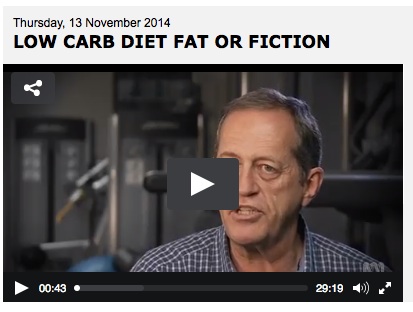
Click the link below to watch or read the transcript:
http://www.abc.net.au/catalyst/stories/4126228.htm
This was a great documentary that aired recently in Australia. It looks to me like Maryanne Demasi is passionate about how the current recommendations for a healthy diet are killing us but she seems also tied in to the journalists creed of needing to tell both sides of the story. That’s something that really irks me because I think we need to take a proper stand on this.
Why?
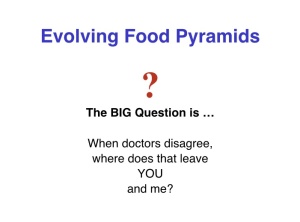 I’m firmly in the LCHF, low carb high/healthy fat, camp. If you don’t know my story yet – I was inspired by all the fat was bad for you ‘propaganda’ I heard and saw in medical school to become a HCLF, high carb low fat, vegetarian. After decades of eating like this – primarily vegetarian, whole grain eating (including being wheat free for over 20 years and wheat free vegan for 10 years) – I developed various signs of inflammation in my early 50’s. You could say I went from ‘apparently healthy’ to quite a sick puppy in an astoundingly short space of time. For me the diseases were blepharitis, pustular rosacea, testicular cancer and to add insult to injury my blood lipid profile went bad (high LDL and Triglycerides).
I’m firmly in the LCHF, low carb high/healthy fat, camp. If you don’t know my story yet – I was inspired by all the fat was bad for you ‘propaganda’ I heard and saw in medical school to become a HCLF, high carb low fat, vegetarian. After decades of eating like this – primarily vegetarian, whole grain eating (including being wheat free for over 20 years and wheat free vegan for 10 years) – I developed various signs of inflammation in my early 50’s. You could say I went from ‘apparently healthy’ to quite a sick puppy in an astoundingly short space of time. For me the diseases were blepharitis, pustular rosacea, testicular cancer and to add insult to injury my blood lipid profile went bad (high LDL and Triglycerides). After being handed information by my GP’s nurse that essentially told me to eat less red meat and more whole grain and fruits and veggies to get my blood fats right, essentially what I had been eating for 30+ years, I decided to do the opposite. After much research and eating of humble pie I decided to go LCHF. Although I hadn’t heard the name back then, that would come later. Since then the blepharitis and rosacea have reduced markedly. They’ll easily flare up again with chocolate and alcohol so I keep these to a minimum. My blood fats came back to normal within 3 months. Essentially from one blood test to the next. And more importantly from a day to day perspective i no longer have the struggle with my weight that I’ve had all my life since teenage. Plus I feel so good in myself and as great as that is, it’s also annoying in that I could have been feeling like this for the past 40 years if the HCLF diet fad hadn’t got so deeply entrenched in our collective consciousness.
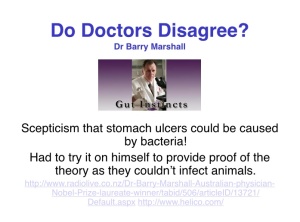
So a lot of this video I fully agree with and support. There are however some of comments I want to address. Catalyst is great in that you can listen to the video or read the transcript or both. The transcript is good because you can, like I’ve done, pull out the comments you want to address without having to revisit the whole video,
What I see in this documentary is a lot of common sense and science being shared by the people and professionals in the LCHF camp and a lot of fear and the sense of losing control from the ‘professionals’ in the HCLF camp, But then I am happily biased because of my own personal experience and the results I’ve seen in those I’ve mentored with LCHF:). I highlight these comments because anyone who is contemplating the switch to LCHF often has these same conversations running in their own heads. They create doubt and confusion, which can trip you up in your journey back to health.
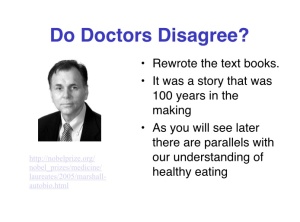 Associate Professor Tim Crowe
Associate Professor Tim Crowe“All diets fail because they’re prescriptive and they go against our normal eating habits. And the more restrictive they are, the harder they are to follow. It’s really hard to give up bread, pasta, rice, things we really love. That’s what you have to say goodbye to in a low-carb diet. So most people, eventually they will start reverting back to their old lifestyles and they will be back to square one, ready to soak up the next fad diet that comes along.“
It’s true, it is about changing your lifestyle. This isn’t a temporary diet that you use to fix yourself up so you can go back to your old habits. It’s vitally important for you to understand and appreciate that your ‘old habits’ are what created the problems in the first place. Going back to them means going back to the symptoms that are hopefully waking you up.
It’s a lifestyle change that needs to be adopted and entered into wholeheartedly. From my perspective and all the science I’ve read, the LCHF lifestyle IS our NORMAL eating habit. It’s the HCLF diet promoted by the people, that should know better, that in my opinion, is the biggest FAD diet that people have fallen for. Even professionals.
Can it be hard to make the change? Yes.
Should that be a reason for not making the change? No.
Any change is hard but that doesn’t mean it’s not worthwhile. There are two important things I see that can help you make the transition permanent.
1. We need to recognise how addictive carbs are. Sugar lights up the same pleasure centres in the brain as cocaine. We need to have an honest conversation with ourselves about this. It can be a shock to realise how addicted to carbs you are. Mental preparation can be needed. Beyond that going cold turkey is generally the best approach. We all know that in ‘dealing with the devil’ the devil will be the more likely winner.
2. It’s not just as Tim says a ‘low carb’ diet. That’s a common fallacy that we fall for. It’s also a High Fat diet. The biggest mistake I see is that we are so ingrained in believing fat is bad for you that we unconsciously avoid it. I did this myself for a while. When you do this you tend to ‘lean’ (pun intended) to a lean, low carb, high protein diet. That’s a recipe for failure with this.
Because both carbs AND excess protein turn to sugar in the body and stimulate insulin. Insulin driven hunger is what can drive you back to carbs. Fat has no effect on insulin levels and healthy fats plus adequate protein mean this is about eating to satisfaction. It can take a while to learn to eat till we’re satisfied because when you are eating carbs so much of our lives is spent in the struggle of our very own Hunger Games. If you’ve ever tried to lose weight, or simply keep your weight down, you’ll understand the process of wrestling with hunger from one meal to the next.
Thankfully when you get this right it’s a lot easier than you imagine it would be. And once you are through to the other side of having a metabolism that runs on fat rather than carbohydrate and you feel the clarity and steadiness of mind and physical energy that comes with it, I bet you’ll be wondering why on earth you didn’t make this change sooner:)! Once you have truly experienced that, along with the effortless weight loss and the feeling of being satisfied for hours and hours, you’ll find it’s EASY to stay eating that way and to get back to this NORMAL way of eating if you ever stray.
Melanie McGrice
“I don’t believe that everybody with diabetes should automatically be going on to a low carbohydrate diet. People who have medical conditions such as diabetes, really should be going and seeing their accredited practising dietician for that personally tailored advice because people don’t just come with diabetes, they come with a whole range of different, other medical conditions. They come from different backgrounds, they have different lifestyles.”
“I don’t believe that everybody with diabetes should automatically be going on to a low carbohydrate diet. People who have medical conditions such as diabetes, really should be going and seeing their accredited practising dietician for that personally tailored advice because people don’t just come with diabetes, they come with a whole range of different, other medical conditions. They come from different backgrounds, they have different lifestyles.”
Diabetes Australia ‘The public discussion about diabetes should not be about ‘diets’. There is no general diet and we should aim to have individualised, tailored advice for people with diabetes.
In my mind this is pure scaremongering. If you are diabetic your body is telling you it can’t deal with carbohydrate, period. Listen to it rather than authorities that don’t know any better but should.
Given that Melanie and Diabetes Australia say that you need them or you may get in trouble if you do something outside the ‘norm’, how scientific do you think their advice will be to your situation when they control what registered dietitians are allowed to promote as a healthy diet? Did you know they could lose their license and their livelihood if they go too far into the LCHF camp? How they can justify earning $45,000-$95,000 to teach information that can harm people and keep them struggling against a downhill slope, is beyond me. What would you do with a mechanic that didn’t tune your car well or look after it properly so that it kept on breaking down and under performing?
Professor Katherine Samaras
“So this is what the average patient with diabetes in hospital today would have had for breakfast. Cereal, one slice of bread, the little bit of jam for that, some fruit and little bit of milk to put on their cereal. But what that amounts to when you actually calculate the carbohydrate content is equivalent to 14 teaspoons of sugar.”
“So this is what the average patient with diabetes in hospital today would have had for breakfast. Cereal, one slice of bread, the little bit of jam for that, some fruit and little bit of milk to put on their cereal. But what that amounts to when you actually calculate the carbohydrate content is equivalent to 14 teaspoons of sugar.”
“An alternative is to give people two slices of bread and an egg. It only has half the amount of total carbohydrate. So 7 teaspoon equivalents of carbohydrate versus 14.”
Katherine says some good things but loses the plot on this one. 7 teaspoons of carbohydrate is 35gms of carbohydrate. There are many diabetics who need to get below 20 grams a day and stay there to be healthy and have a return of low normal blood sugars and become sensitive to insulin again.
Why not just ditch the bread altogether and give them 2-3-4 eggs or eggs and bacon for breakfast? Get the carbs down to zero for breakfast and get all those carb intolerant people off to a good start to the day. Of course free range bacon and eggs would be best.
Melanie McGrice
“I think it doesn’t matter which side of the fence you’re sitting on, whether you’re going to be following a low carbohydrate diet or a higher carbohydrate diet, one of the key messages everybody agrees with is the fact that we should be following a diet that has non-processed foods and lots of whole foods.”
“I think it doesn’t matter which side of the fence you’re sitting on, whether you’re going to be following a low carbohydrate diet or a higher carbohydrate diet, one of the key messages everybody agrees with is the fact that we should be following a diet that has non-processed foods and lots of whole foods.”
Non-processed and whole foods are absolutely the best idea. But whose choice of what’s a good whole food for you varies dramatically. In the dietitian’s camp you’ll likely be eating whole grain bread and fruit. In the LCHF camp you’ll likely not be eating those or limiting them severely. If you take a leaf out of Dr David Perlmutter’s ‘Grain Brain’ you’ll be ditching grain entirely.
Your choice of whole food will either send you flailing down a relentless slippery slope and off it’s precipitous edge to your doom or help you find footholds so you can climb safely back and away from the cliff edge into a new day. And only you can decide who you are going to listen to. So you’d better choose well.
Now that I’ve got that off my chest I’ll leave you with some of my favourite quotes from this documentary that will hopefully find a welcome home in your head and heart.
What they deny is that humans have no requirement for carbohydrates.
Dr Peter Brukner
I think the fat is really important. It’s sort of hard to get your head around the fact that, you know, the more fat you eat, the more fat you lose.
Saturated fat is not bad for you, we know that now. There is ample evidence that saturated fat is not the bogey it used to be. It’s a great source of energy.
Pete Evans
We know this, chefs know it – fat equals flavour. How good is that?
We know this, chefs know it – fat equals flavour. How good is that?
Dr Troy Stapleton
– himself a Type 1 Diabetic
We know we’re not doing very well with our current dietary recommendations for diabetes.
Dr Peter Brukner
These people don’t metabolise carbohydrates well. That’s what diabetes is, it’s a failure to metabolise carbohydrates. Yet we’ve traditionally given these people high-carbohydrate diets. I mean, it just does not make any sense at all.
These people don’t metabolise carbohydrates well. That’s what diabetes is, it’s a failure to metabolise carbohydrates. Yet we’ve traditionally given these people high-carbohydrate diets. I mean, it just does not make any sense at all.
NARRATION
A critical review of the literature suggested that low-carb diets should be the first treatment option in diabetes because of the consistently good control of blood glucose and the reduction, or elimination, of diabetes medication.
A critical review of the literature suggested that low-carb diets should be the first treatment option in diabetes because of the consistently good control of blood glucose and the reduction, or elimination, of diabetes medication.
Gabrielle Brunsdon
No hunger. There’s no hunger.
No hunger. There’s no hunger.
To get your free copy of my 5 Resources To Help You End Your Battle With Your Food and Your Weight and Food in which I encapsulate all the authors I’ve read and provide the real nitty gritty of what most of us need to eat, go to www.lchfdietmentor.com
To look at my LCHF mentoring options to dic be the best fit for you:

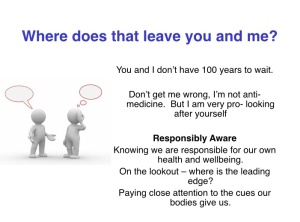
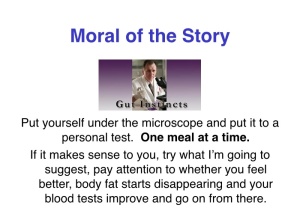
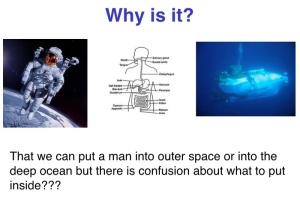
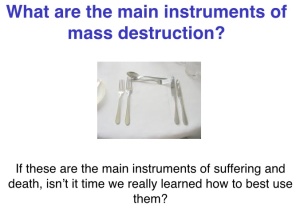
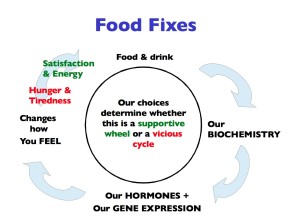
Thanks for clearing all this up!
Great article! I often use diets in my life but all my friends think that “diet” means less carb in my eating life but it’s not true. Healthy carb is extremely important for healthy living! Probably the biggest thing for me was knowing my carbohydrates; it made a huge difference when I started to discover the difference between simple and complex carbohydrates.